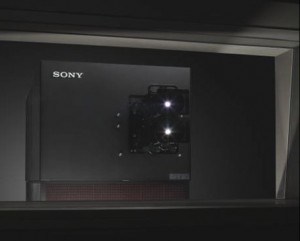 On both ends of the spectrum of modern distribution, there lies turmoil. On the ass end of things, studios are in a desperate place where they’re trying to milk the maximum amount of profit and time out of the quickly dwindling DVD market, all while the writing is on the wall for that paradigm. On the front end of the distribution beast, 3D projection and digital conversion continues to march on, creating controversy as studios and theaters wrestle over on whose dime that progression happens, and whether or not 3D will continue to bolster box office. Transition period are always tough, and it’s even more the case as even the disruptive companies like Netflix are finding themselves threatened by a dozen other upstarts. This is not the old days where one company gets to be clever and supplant the old slow-moving company for the next decade or two…
On both ends of the spectrum of modern distribution, there lies turmoil. On the ass end of things, studios are in a desperate place where they’re trying to milk the maximum amount of profit and time out of the quickly dwindling DVD market, all while the writing is on the wall for that paradigm. On the front end of the distribution beast, 3D projection and digital conversion continues to march on, creating controversy as studios and theaters wrestle over on whose dime that progression happens, and whether or not 3D will continue to bolster box office. Transition period are always tough, and it’s even more the case as even the disruptive companies like Netflix are finding themselves threatened by a dozen other upstarts. This is not the old days where one company gets to be clever and supplant the old slow-moving company for the next decade or two…
The latest development on the disc front is news that Warner Brothers is more than ready to push second-party distributors like Redbox and Netflix all the way down the slippery slope they began with their “28 day window” plan, which Netflix agreed to ages ago so they could get wider access to the WB catalog. Well now the big guy wants to turn that into a 56 day delay, which would push DVD rentals on down the timeline so that hopefully the kids will buy more of the discs. Blockbuster and Redbox are pissed, probably for different reasons– one is the newest successful disruptor, while the other is barely clinging on for dear life.
 Netflix–which has become the new bloated, entrenched media company that doesn’t have its shit together or its former mobility–is going right along with the plan, with some claiming Instant Watch doesn’t rely on new releases. Their business model is long-tail enough that I’m sure that’s mostly true, but I’m also not sure how doubling the window is going to help Netflix. There’s no sign of a sweetheart deal that somehow benefits them after the window is up, so this sounds like Netflix going with the flow and not raising a fuss so they can keep in studio graces. I mean, with more and more viable streaming platforms out there, Netflix can’t really afford to piss anybody off anymore, can they? I guess that’s what happens when you become the corporate behemoth with your own shareholders and a shitty stock price…
Netflix–which has become the new bloated, entrenched media company that doesn’t have its shit together or its former mobility–is going right along with the plan, with some claiming Instant Watch doesn’t rely on new releases. Their business model is long-tail enough that I’m sure that’s mostly true, but I’m also not sure how doubling the window is going to help Netflix. There’s no sign of a sweetheart deal that somehow benefits them after the window is up, so this sounds like Netflix going with the flow and not raising a fuss so they can keep in studio graces. I mean, with more and more viable streaming platforms out there, Netflix can’t really afford to piss anybody off anymore, can they? I guess that’s what happens when you become the corporate behemoth with your own shareholders and a shitty stock price…
Blockbuster and Redbox will not take the move as lightly, as Blockbuster will continue to purchase Warner DVDs their damn selves, renting them out day of (bitches). Redbox previously acquiesced to the 28-day deal same as Netflix, but that contract expires soon and sources suggest they’re not keen on re-upping with a longer window. I would imagine the successful little red kiosks make parent company Coinstar (!) enough cash that they too could go the direct purchase route, and circumvent Warner Brothers arrangement. Of all these players, it’s really Redbox that’s in the position to milk the DVD market for all its worth for the longest, and will probably be able to keep making money off of it long after the format is out of style. Much easier to keep providing for the latent format stragglers when you have relatively minimal overhead.
 Meanwhile on the front-end, studios have an equally contentious struggle with the theater chains these days too. We’ve covered the in-fighting over 3D glasses, projector conversion, and the like, but the discussions tend to focus on the big chains that actually care about the blockbusters being released in 3D. The thing is, as legitimate auteurs like Werner Herzog and Martin Scorsese start to make 3D films (disregarding the infinite fanboy wisdom claiming they shouldn’t), it becomes clear that the art house theaters may be missing opportunities. Baz Luhrmann’s star-studded take on the classic novel The Great Gatsby is sure to be only the first of many dramas released in the format that are less dependent on spectacle. Some of these, like last year’s Cave of Forgotten Dreams (last year’s most successful independent documentary), are the art house scene’s bread and butter, yet might get snapped up by bigger chains with the screens to accommodate their extra dimension. But is the cost worth it for the little guys?
Meanwhile on the front-end, studios have an equally contentious struggle with the theater chains these days too. We’ve covered the in-fighting over 3D glasses, projector conversion, and the like, but the discussions tend to focus on the big chains that actually care about the blockbusters being released in 3D. The thing is, as legitimate auteurs like Werner Herzog and Martin Scorsese start to make 3D films (disregarding the infinite fanboy wisdom claiming they shouldn’t), it becomes clear that the art house theaters may be missing opportunities. Baz Luhrmann’s star-studded take on the classic novel The Great Gatsby is sure to be only the first of many dramas released in the format that are less dependent on spectacle. Some of these, like last year’s Cave of Forgotten Dreams (last year’s most successful independent documentary), are the art house scene’s bread and butter, yet might get snapped up by bigger chains with the screens to accommodate their extra dimension. But is the cost worth it for the little guys?
Variety has an interesting collection of quotes from various chains and directors that spoke on the topic, but it boils down to the fact that small struggling theaters can’t afford to drop ~150k on updated systems that will take a year to pay for themselves. Without being fully convinced of the financial upsides (which is still a benefit of arguable importance for many blockbusters) it’s just not going to happen anytime soon. How damaging that might be to them remains to be seen, but it’s yet another sign of serious stretch marks in a warping marketplace.
How long do you figure it will be before a new status quo establishes itself and we enter some new realm of normality? Really, will it ever happen, or have we gone over the edge of a precipice of change that won’t stop until we’re using technology and absorbing movies in ways we could never have predicted?
Twitter
Comment Below
Message Board
WB Delay News via THR